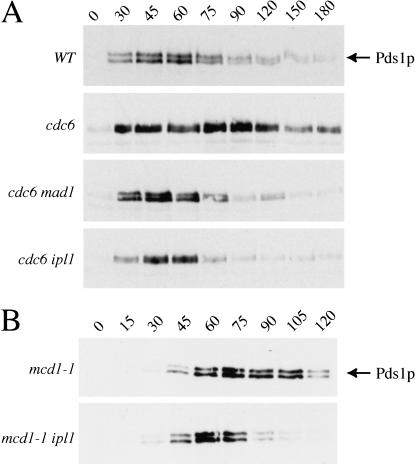Figure 4.
Ipl1p is required for the checkpoint arrested induced by kinetochore tension defects. (A) Cells depleted of the Cdc6 protein were grown at the permissive temperature (23°C) and arrested in G1 with α-factor. Cells were then released from G1 to the nonpermissive temperature (37°C) in glucose to keep GAL-CDC6 repressed; Pds1p levels were analyzed by immunoblotting. Pds1p levels cycle in wild-type cells (SBY818) but are stabilized in GAL-CDC6 cells grown in repressing media (SBY772). Pds1p levels are not stabilized in GAL-CDC6 mad1Δ (SBY762) and GAL-CDC6 ipl1-321 (SBY771) mutant cells, indicating that the checkpoint is not activated. (B) mcd1-1 (SBY870) and mcd1-1 ipl1-321 cells (SBY871) were arrested in G1 with α-factor at the permissive temperature. They were released to the nonpermissive temperature (37°C) in the absence of α-factor, and Pds1-myc18 protein levels were monitored by immunoblotting. There is a delay in the degradation of Pds1p in the mcd1/scc1 mutant cells that is eliminated in the mcd1-1 ipl1-321 cells, indicating that Ipl1p is required for the spindle checkpoint induced by defects in sister chromatid cohesion. Equal protein concentrations were loaded in all lanes as judged by Ponceau S staining (data not shown).

